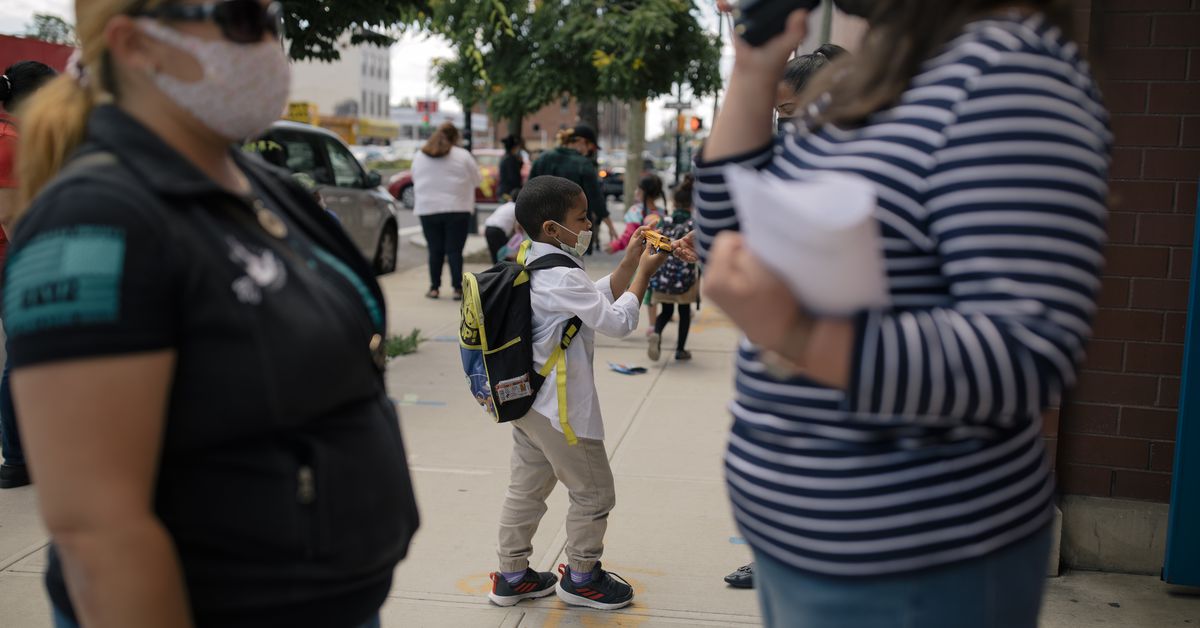Internet access, teacher recruitment and student well-being top list of state group’s education priorities :: WRAL.com
Broadband internet access is one of North Carolina’s top education issues, according to the Public School Forum of North Carolina’s annual list released Thursday.
The education policy think tank typically lists 10 issues as priorities at their Eggs & Issues Breakfast in Raleigh each winter. This is the first time broadband internet has been on the list since the breakfasts started in 2015. The breakfast was virtual this year.
But better access to the internet fits in with the group’s continued push for equitable access to quality education, particularly as the COVID-19 pandemic has forced the bulk of North Carolina’s children to attend school online.
State Rep. Ricky Hurtado, D-Alamance and a panelist at the virtual breakfast, argued internet needs to be treated like a more essential service, such as water.
“This is an important part of our lives, especially in rural North Carolina,” he said.
Nearly 90% of North Carolinians have access to wired broadband, according to Broadband Now. That means they could get internet if they wanted to. Less than half of North Carolinians have a low-price option for wired internet.
According to NC OneMap, in 2019, one in nine North Carolina households didn’t have a computer. Only 30% — less than one in three — households with children actually subscribed to broadband internet.
The Public School Forum urges leaders to address affordability issues that prevent families from purchasing internet service. The second federal coronavirus stimulus package offers families $50 per month subsidies to access the internet, but the Public School Forum contends long-term planning will be necessary to reduce the cost of internet.
At the state level, Gov. Roy Cooper and lawmakers in December agreed to release $30 million toward rural broadband projects.
Broadband was among the most important issues among attendees of the virtual breakfast Thursday. In a poll of attendees, 42% listed it among their top three priorities, second only to teacher recruitment, retention and diversity (48%) — one of the long-standing priorities of the Public School Forum.
According the group, increasing support and resources for teachers are critical parts of compliance with the Leandro lawsuit, the federal court case that has required the state to provide access to an equitable education for all North Carolina children.
The Leandro case loomed large over the panel’s discussions of equity and improving educational opportunities for students and in each of the group’s top issues, though it wasn’t specifically listed as one of the top issues.
A lack of equitable opportunities has led to a gap in achievement among income levels and races that only further makes students of color feel like there’s something wrong with them, panelists said.
The other nine top issues are:
- Teacher recruitment, retention and diversity
- Social and emotional learning (SEL)
- Inclusive, culturally responsive curriculum and pedagogy
- Flexibility for local school districts
- Assessment and accountability
- Afterschool programs and expanded learning
- Early childhood education and literacy
- Post-secondary attainment
- Adequate and equitable state funding to support public education
STUDENT AND TEACHER WELL-BEING
Educators focused on the wellbeing of students during the panels Tuesday, emphasizing not only the social and emotional learning practices that have been growing for years but also the need to make sure kids are doing OK and continue to be motivated while the future remains foggy.
Daniel Scott, Swansboro High School band director and a state regional teacher of the year, said he had a promising student drop out of high school this fall. The school didn’t have its jazz band program during the fall, which Scott said had been motivating the student throughout his scholastic career. The student is back now, after Scott told him the jazz band program would be back this spring.
Students and educators are feeling lost and are grieving the future, he said.
“None of our students or colleagues have complete purpose of what we’re accomplishing at the end of the year,” he said.
It’s especially hard on students, who may be at the age of onset of mental illness. About half of mental illnesses begin showing up by age 14, Scott said.
Students and educators can be helped by more transparency of the state’s vaccine rollout, budgeting planning and summer programs, he said. Outreach and support for students and educators is also essential.
For educators, said Scott Elliott, Superintendent of Watauga County Schools, the impact of the pandemic and current education setups on students weigh heavily on teachers.
SOCIAL STUDIES STANDARDS
Panelists also weighed in proposed changes to the state’s social studies standards, which have been debated heavily among state Board of Education members.
The new standards emphasize telling history through multiple perspectives, including discussing racism, marginalized groups and the impact of policies on different populations. Students may be asked to compare narratives of different perspectives or to list examples of how individuals have resisted and overcome “inequities, injustice, and discrimination within the American system of government over time.”
Opponents of the standards have said they’re concerned they may cause an over-emphasis on the negative parts of U.S. history and yield divisive politics.
Proponents have argued the new standards would tell a more complete story of U.S. that would allow people to better understand the country and make progress toward improving it.
On Thursday, panelists at the Eggs and Issues breakfast favored the standards.
Hurtado said conflicts in U.S. history have made the country stronger.
“That is the beauty of America,” he said. He said discomfort shouldn’t deter conversations.
“We need to have honest conversations, lean into that discomfort, collectively embrace history and move forward,” he said.
Reagan Razon, a Wake County Public School System senior on the panel, said her peers are hungry to talk about difficult things and want to do it in the classroom.
Razon contended even small changes could make a difference, such as using people-first language inside and outside of social studies classrooms. That would include saying “people who were enslaved” instead of “slaves” or “people who are homeless” instead of “the homeless.”
Maggie Murphy, an Alleghany County Schools teacher, supports the standards and recalled a history textbook she used to have that spent only one paragraph describing the Holocaust.
That wasn’t enough space for such a big issue, she said.
“When we take important things like that and we either diminish them, make them smaller, less important seeming, we are doing a disservice to our students,” she said.







